Passavant Surname Ancestry ResultsOur indexes 1000-1999 include entries for the spelling 'passavant'. In the period you have requested, we have the following 37 records (displaying 21 to 30): Single Surname Subscription | | | Buying all 37 results of this search individually would cost £196.00. But you can have free access to all 37 records for a year, to view, to save and print, for £100. Save £96.00. More... |
These sample scans are from the original record. You will get scans of the full pages or articles where the surname you searched for has been found. Your web browser may prevent the sample windows from opening; in this case please change your browser settings to allow pop-up windows from this site. Inhabitants of Bradford, Yorkshire
(1853)
William White's directory lists traders, farmers and private residents in the area.PASSAVANT. Cost: £6.00.  | Sample scan, click to enlarge
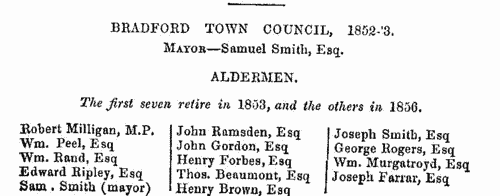
| Inhabitants of Leeds, Yorkshire
(1853)
William White's directory lists traders, farmers and private residents in the area. PASSAVANT. Cost: £6.00.  | Sample scan, click to enlarge

| Inhabitants of Saddleworth, Yorkshire
(1853)
William White's directory lists traders, farmers and private residents in the area. When searching the early records it is important to note that Saddleworth, although being in the West Riding of Yorkshire, was a chapelry of the parish of Rochdale in Lancashire, and so lay in the diocese of Chester (and later Manchester), not in the diocese of York. These pages also include Bingley and Baildon, but which were both in the county and diocese of York.PASSAVANT. Cost: £6.00.  | Sample scan, click to enlarge

| Patentees of New Inventions
(1854)
Abstracts of British patents for new inventions applied for and granted from 1 January to 31 December 1854: giving date, name and address, and short description of the invention. It is then stated whether 'Letters patent sealed' or 'Provisional protection only'.PASSAVANT. Cost: £6.00.  | Sample scan, click to enlarge

| Dissolutions of Partnerships
(1855)
Trade partnerships dissolved, or the removal of one partner from a partnership of several traders: in England and Wales
PASSAVANT. Cost: £6.00.  | Sample scan, click to enlarge

| Boys entering Leeds Grammar School Lower (Commercial) Department
(1861)
The admission books for Leeds Grammar School from 1820 to 1900 were edited by Edmund Wilson and published in 1906. The series of registers is almost complete for the period, there being in addition admission registers for the Lower (or Commercial) Department from 1856 to 1865, and lists of boys in the school in 1856, and in the Commercial Department in 1861. The entries are arranged by date or term of admission: a sequential number is given first, then surname, christian name, and, after a dash, father's christian name, occupation, and address; another dash, and then the age of the boy at admission, and often his year of leaving (with the abbreviation r. for 'removed' or 'left'). r.* means left without notice; (o) or S. or Stranger or Foreigner indicates a boy not on the foundation. The editor was unable to divine the meaning of the abbreviation (Q) or the asterisks prefixed to most entries in 1856 to 1860, but dutifully copies them into the text. In smaller type he then proceeds, where possible, to add some information about the boy's subsequent career.PASSAVANT. Cost: £4.00.  | Sample scan, click to enlarge
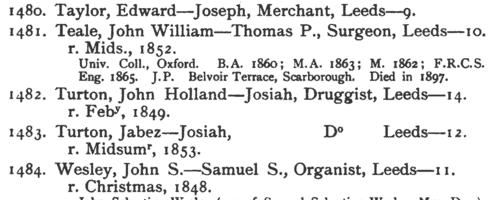
| Boys in Leeds Grammar School Lower (Commercial) Department
(1861)
The admission books for Leeds Grammar School from 1820 to 1900 were edited by Edmund Wilson and published in 1906. The series of registers is almost complete for the period, there being in addition admission registers for the Lower (or Commercial) Department from 1856 to 1865, and lists of boys in the school in 1856, and in the Commercial Department in 1861. The entries are arranged by date or term of admission: a sequential number is given first, then surname, christian name, and, after a dash, father's christian name, occupation, and address; another dash, and then the age of the boy at admission, and often his year of leaving (with the abbreviation r. for 'removed' or 'left'). r.* means left without notice; (o) or S. or Stranger or Foreigner indicates a boy not on the foundation. The editor was unable to divine the meaning of the abbreviation (Q) or the asterisks prefixed to most entries in 1856 to 1860, but dutifully copies them into the text. In smaller type he then proceeds, where possible, to add some information about the boy's subsequent career.PASSAVANT. Cost: £4.00.  | Sample scan, click to enlarge
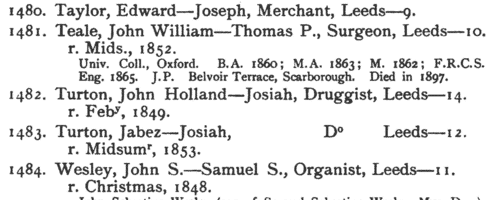
| Boys entering Leeds Grammar School: Upper (Classical) Department
(1862)
The admission books for Leeds Grammar School from 1820 to 1900 were edited by Edmund Wilson and published in 1906. The series of registers is almost complete for the period, there being in addition admission registers for the Lower (or Commercial) Department from 1856 to 1865, and lists of boys in the school in 1856, and in the Commercial Department in 1861. The entries are arranged by date or term of admission: a sequential number is given first, then surname, christian name, and, after a dash, father's christian name, occupation, and address; another dash, and then the age of the boy at admission, and often his year of leaving (with the abbreviation r. for 'removed' or 'left'). r.* means left without notice; (o) or S. or Stranger or Foreigner indicates a boy not on the foundation. The editor was unable to divine the meaning of the abbreviation (Q) or the asterisks prefixed to most entries in 1856 to 1860, but dutifully copies them into the text. In smaller type he then proceeds, where possible, to add some information about the boy's subsequent career.PASSAVANT. Cost: £4.00.  | Sample scan, click to enlarge
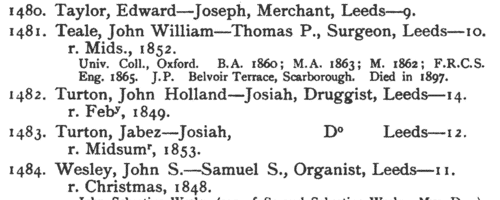
| Boys entering Leeds Grammar School: Upper (Classical) Department
(1863)
The admission books for Leeds Grammar School from 1820 to 1900 were edited by Edmund Wilson and published in 1906. The series of registers is almost complete for the period, there being in addition admission registers for the Lower (or Commercial) Department from 1856 to 1865, and lists of boys in the school in 1856, and in the Commercial Department in 1861. The entries are arranged by date or term of admission: a sequential number is given first, then surname, christian name, and, after a dash, father's christian name, occupation, and address; another dash, and then the age of the boy at admission, and often his year of leaving (with the abbreviation r. for 'removed' or 'left'). r.* means left without notice; (o) or S. or Stranger or Foreigner indicates a boy not on the foundation. The editor was unable to divine the meaning of the abbreviation (Q) or the asterisks prefixed to most entries in 1856 to 1860, but dutifully copies them into the text. In smaller type he then proceeds, where possible, to add some information about the boy's subsequent career.PASSAVANT. Cost: £4.00.  | Sample scan, click to enlarge
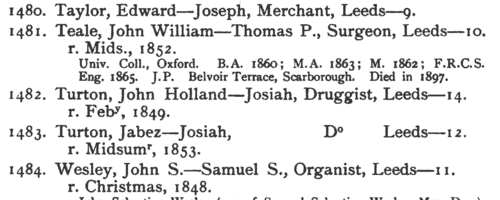
| Patentees of New Inventions
(1863)
Abstracts of British patents for new inventions applied for and granted from 1 January to 31 December 1863: giving date, name and address, and short description of the invention. It is then stated whether 'Letters patent sealed' or 'Provisional protection only'.PASSAVANT. Cost: £6.00.  | Sample scan, click to enlarge
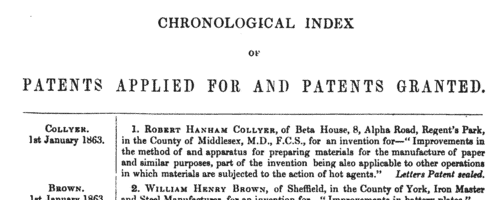
|
Research your ancestry, family history, genealogy and one-name study by direct access to original records and archives indexed by surname.
|












